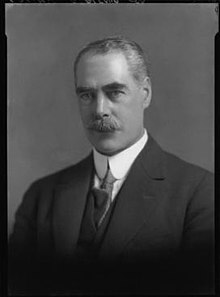George Balfour (Conservative politician)
George Balfour | |
|---|---|
 Balfour in 1928 | |
| Born | 1872 |
| Died | 26 September 1941 |
| Nationality | British |
| Occupation | Engineer |
| Engineering career | |
| Discipline | Mechanical engineering |
George Balfour (1872 – 26 September 1941) was a British Conservative Party politician and engineer. He was of Scottish parentage where he also spent part of his upbringing but was born in Portsmouth, England. He served his long parliamentary career representing a constituency in the County of London and lived much of his life in England.
Career
George Balfour joined the Blackness Foundry in Dundee as an apprentice in 1888. He subsequently qualified as a mechanical and electrical engineer.[1] In 1909, together with Andrew Beatty, an English accountant, he founded Balfour Beatty which was to become an international construction business.[1] Under his leadership the company installed a new tramway system in Dunfermline in Fife.[1] The two partners also founded Power Securities, a business established to pursue opportunities in hydro-electric power, in 1922.[1]
Political life
From 1918 to 1941, Balfour sat as Member of Parliament (MP) for Hampstead.[2] He contributed to many debates on employment issues.[1]
Death
Balfour died on 26 September 1941 at which time he was still a serving MP.[1]
References
